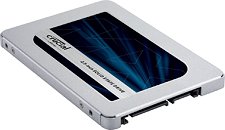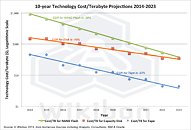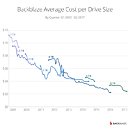Monday, November 26th 2018
SSDs Are Cheaper Than Ever, Hit the Magic 10 Cents Per Gigabyte Threshold
It may be quite difficult to find bargains when it comes to DDR4 system memory or high-end graphics cards these days, but at least SSDs are more affordable now to help bandage that wound. This price drop of solid state storage has been happening throughout this year, and some units have reached a cost of 10 cents per gigabyte, a milestone difficult to have imagined a couple of years ago. The 2 TB variant of the Crucial MX500 SSD, for example, can be found now at $209, and those interested may want to check out our review of the 1 TB version before committing to a purchase.
This is great news already, but there is even better news coming as that cost will reportedly continue to drop. NAND flash could drop to $0.08 per gigabyte in 2019 according to some analysts, and some alternatives such as QLC drives from Samsung could push that trend even further. The traditional HDD market is also getting more inexpensive and better bang-for-your-buck, with a 2017 report from BackBlaze showed for example how cost per gigabyte was approaching $0.02 per gigabyte a year ago on some units. As always, price prediction reports tend to come out with the US market as a case study, but our own global TechPowerUp team is appreciating having more SSDs on deck for files and programs alike.
Source:
Tom's Hardware
This is great news already, but there is even better news coming as that cost will reportedly continue to drop. NAND flash could drop to $0.08 per gigabyte in 2019 according to some analysts, and some alternatives such as QLC drives from Samsung could push that trend even further. The traditional HDD market is also getting more inexpensive and better bang-for-your-buck, with a 2017 report from BackBlaze showed for example how cost per gigabyte was approaching $0.02 per gigabyte a year ago on some units. As always, price prediction reports tend to come out with the US market as a case study, but our own global TechPowerUp team is appreciating having more SSDs on deck for files and programs alike.



70 Comments on SSDs Are Cheaper Than Ever, Hit the Magic 10 Cents Per Gigabyte Threshold
Die spinners, die :D
Does anyone have a chart that shows how fast the capacity of SSD's has grown in the past few years ?
The only thing I wanted to add to my upcoming rig is 1TB of SSD storage, cause new games are getting ridiculous : FO4 is nearing 90GB, Shadow of War is ~110GB.... Give it a couple of years, and half-assed AAA games will get as fat as quarter of a TB or more.
In addition, consider that this graph does not factor in the inevitable virus, flood, man bumping foot on pavement, and of course shutting down fabs due to high demand.
The only problem here would be mounting a r/o drive with a file system that does things like try to journalize or update access times. Because that would fail on a SSD in that state.
HDDs on the other hand... if sectors go bad, they go bad, the data there is gone. And if all sectors are ok, but the drive fails because of a mechanical problem, good luck fixing that without at least a trip to a specialized service.
Benchmark scores - who cares ? We don't make a living running benchmarks. Gaming ... after launching the game, the PC is ready for me before I am ready for it (removing dongle from headset storage cubby, closing cubby, plugging in dongle, donning head phones, loading discords, loading web page data pages.
Boot time - 15.6 seconds on expensive "Pro" SSD versus 16.5 seconds for SSHD. The 0.9 seconds over 2 -4 weeks time is not an impact, especially when after rebooting, I'm listening to phone messages and returning calls, grabbing a caw-fee, checking my inbox and won't do squat for 15 - 20 minutes.
Backups and Large File Transfers - Done at night, or when leaving desk...if not, it's a background task ... otherwise something usually done once in PC lifetime (new build)
Other than missing out on bragging rights w/ benchmark scores, there's no real world gain for faster storage in office or home ... 2 TB SSHD costs me less than 5 cents a MB.
Now there was a day I'd paid $1000 for a 1 GB SCSI HD and it was certainly worth the investment. But AutoCAD (2D and 3D) is no longer bound by the storage speeds of those days. If I was video editing, animation or rendering, I'd have nothing else by SSDs as with that usage. Over last 8 going on 9 years, have put a SSD + SSHD in every one of our builds .... In that period have had 0 SSHD failures... in one case the lappie died, SSHD was pulled and is used in a HD dock for offsite storage. Over same period, (4) SSDs have failed... but none in the last 5, maybe 5.5 years, so today's units clearly have better longevity. One of those, replaced under warranty, failed a second time and that purchase accounts for 2 of the failures.
I love that prices are getting cheaper, even as it is "the cheap stuff" here... But until I see 2 TB units approaching $100, not exactly a ROI in making this move. At $150, tho it might be attractive if only to be able to use a smaller case.
LOL, i remember my crucial m4 64gb in 2011, 110$
some months back, crucial mx500 256gb 80$
LOL no it isn't. Vega 64 is $399, and there are piles of dirt cheap Polaris and Pascal cards on eBay. DDR4 is more than it should be, but I honestly give only a couple months for it to come down to Earth finally.
If the prices go down further, & we get similarly lower prices in the rest of the world, many will simply dump HDD in a heart beat including me.
secondly,how did you get these numbers ? they are complete horsesheit. sshds are still slow compared to ssd.
installation
www.purepc.pl/pamieci_masowe/test_dyskow_sshd_seagate_firecuda_compute_hybryda_ssd_i_hdd?page=0,9
www.purepc.pl/pamieci_masowe/test_dyskow_sshd_seagate_firecuda_compute_hybryda_ssd_i_hdd?page=0,8
loading times
www.purepc.pl/pamieci_masowe/test_dyskow_sshd_seagate_firecuda_compute_hybryda_ssd_i_hdd?page=0,10
you can find games and software where they can match a ssd in loading times lke this one
www.purepc.pl/pamieci_masowe/test_dyskow_sshd_seagate_firecuda_compute_hybryda_ssd_i_hdd?page=0,11
but that's not a rule,often times sshd just doesn't perform the way an ssd does,even a crappy 120gb 2d tlc one.they will do good in reviews,but they're set up way to show they're ideal performance. in normal usage that 8gb buffer is laughable. you can buy a ssd and just use intel smart response to allocate up to 64gb. Why would anyone purchase a sshd when you can get a ssd and a hdd is beyone me. isn't it better to control what you want on the fast drive and what you want on the slow drive yourself without resorting to that puny 8gb on the sshd doing it automatically ?
Your fear of SSDs is definitely groundless. HDDs may be more convenient to recover, but SSDs fail significantly less often.
Yes, i may sound overestimating data recovery from ssd but definitely it is not as easy and as successful as it is from hdds. For example infamous intel's ssd 8MB bug, method to recover data from drives with that issue was finalized in 2017 and it still doesn't guarantee recovering data. Said problem plagued intel's drives in 2013 so it makes 4 years of waiting for method which will not give you 100% warranty to recover data from failed drive.
IMO, in every single test of every single ssd should be mention of that in summary in cons, people have to become aware of with speed they buy also something what is not safe device to store data on it, at all.